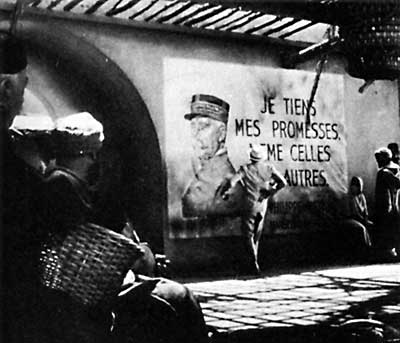Reading about Vichy France reminded me of this film, so I watched it again.
Love the film, but not the many historical inaccuracies in it, though it is easy to forgive them, still we should not forget them. Here are a few.

1.There were Germans in Morocco to monitor the neutrality of the Vichy Administration, but none were permitted to wear uniforms.
2.The Germans dressed in mufti and were confined to poor hotels in Rabat, not Casablanca.
3.The Germans were permitted out and about only when escorted by many French soldiers, almost as though they were prisoners. Had they travelled to Casablanca, they would have had a large French military escort.
4.The French governor of Morocco in Rabat, General Auguste Noguès, had in 1940 advocated continuing the war from North Africa, and he made as many difficulties as possible for the Germans in Morocco, while following the letter of his orders to cooperate. There were complaints by the Germans, but the matter was too low a priority for pressure to be exerted.
5.Ergo there would have been no singing in nightclubs.
6.No questioning of travellers.
7.No truckloads of German soldiers.
8.That immutable letter of transit is wrong, too. De Gaulle’s signature would have landed the bearer in the slammer. Pėtain’s signature perhaps.
9.There was little if any unity among the anti-Nazis within a single country let alone internationally as depicted in the film. No Norwegian would not flash the cross of Lorraine to anyone let alone a Czech.
10. There was a sizeable language barrier between Norwegians, Bulgarians, Czechs, French.
The deep ambiguity of the situation is certainly true and Casablanca was perhaps, I do not know, a magnet for refuges.
Hitler’s only interest in the French Empire was to keep it and its colonial army, warships at anchor, and other military, financial, and natural resources from the Allies. Germany did not have the troops or the access to the four corners of the globe directly to do this, but if the paper-mâché regime at Vichy could effect those exclusions, it was worth the comic opera pretence that it was independent.
There is another ambiguity, too, that of the Roosevelt’s enduring effort to maintain diplomatic relations with Vichy, first when both it and the USA were neutral, and when the USA entered the war he tried hard to maintain diplomatic relations with the still neutral Vichy. Ergo there may well have been an American consul in Casablanca.
FDR also undermined de Gaulle for years, even after the invasion of North Africa, when much to the chagrin of some advisors to FDR, the French troops there responded to de Gaulle, and not the puppet they had put up instead.
These ambiguities muddle the clean lines of the story from the first shooting in front of the poster of Pėtain’s to the bottle of Vichy water at the end, but they explain how confused and confusing the situation was for those individuals.
It is unlikely that the screenwriters had this detailed knowledge. And finally, who cares! It is entertainment not a history lesson.
Skip to content
